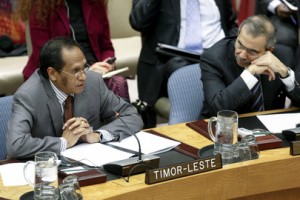Timor-Leste addresses the UN Security Council on behalf of the g7+

On 21 January 2011, the United Nations Security Council convened an Open Debate on Post-Conflict Peacebuilding: Institution Building in order to consider the importance of institution building as part of a comprehensive approach to peacebuilding in countries recovering from conflict and on the road to sustainable development.
After opening remarks by the UN Secretary General, the Vice-Prime Minister of Timor-Leste, H.E. José Luís Guterres, spoke on behalf of g7+, providing a unique perspective from Timor-Leste as to how successful institution building in the aftermath of conflict can provide a strong basis for the further consolidation of peace and security. Ambassador Peter Wittig of Germany then addressed the Council in his capacity as Chair of the UN Peacebuilding Commission (PBC).
In his address to the Security Council, Vice-Prime Minister Guterres proposed four key areas where international engagement in conflict-affected countries could benefit from improvement.
First, international partners must help us build our institutions by working with them – this includes a complete review of the way technical assistance is provided to our countries.
Second, you can not build a nation upon the principles of another. There is no overarching model that can be applied to solve the unique challenges that face our nations. International actors must appreciate the importance of historical context, culture, regional diversities, linguistic complexities, social differences, ongoing political dissonance and the national mentality; all crucial elements in statebuilding in post-conflict nations.
Third, we must be absolutely clear as to the purpose these institutions are intended to serve and then be relentless in this pursuit. Function over form must take priority. It is only when the tangible benefits of these institutions can be seen and felt that citizens’ confidence, trust and engagement with State institutions will emerge.
Fourth, sustained political dialogue within States, between the men and women that make up our communities and Government, is crucial in order to strengthen democracy and encourage buy-in, turning statebuilding into a nationwide endeavor involving all peoples.
UN Secretary General, Mr. Ban Ki-moon stressed the long-term engagement necessary in order to achieve successful peacebuilding. However, also emphasized was the need for short-term, early and tangible progress to be made in a few priority areas to restore confidence and increase the legitimacy of national institutions.
“International efforts have often failed to recognize that building effective institutions is a long-term effort, even in relatively stable conditions. Some progress can be made in three to five years, but expectations need to be realistic. This, of course, has implications for the Council and the missions it mandates,” he said.
In its presidential statement, the Council acknowledged:
“the need for continued improvement in the delivery of supporting the immediate aftermath of conflict in order to help stabilize the situation, whilst at the same time starting the longer-term process of institution building, including those institutions that promote democratic processes and foster economic and social development with a view to sustainable peace.”
Nearly 50 Member States were scheduled to speak in the day long debate.










































